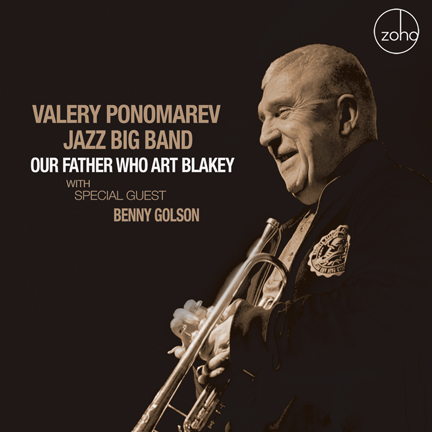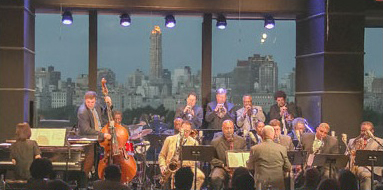|
Valery Ponomarev Jazz Big Band
Our Father Who Art Blakey
Release Date: January 8, 2016
Selection #: ZM 201601
UPC Code: 880956160122
Availability: Worldwide
Songs:
1. Overture 0:56
2. Moanin' 8:10
3. Crises 9:55
4. Jordu 7:37
5. No Hay Problemas 8:52
6. Gina's Cooking 7:41
7. Blues March 15:54
|
Musicians:
Tracks 1, 3 - 9: At Dizzy's Club Coca Cola, August 14, 2014:
Valery Ponomarev - trumpet, composer/arranger, musical director.
Victor Jones - drums
Ruslan Khain - bass
Mamiko Watanabe - piano,
Todd Bashore (lead), Chris Hemingway - alto saxes
Peter Brainin (lead), Steven Carrington - tenor saxes
Anthony Nelson - baritone sax
Stafford Hunter (lead), Alvin Walker, David White, Jack Jeffers - trombones
Rick Henly (lead), Eddie Allen, Josh Evans, Chris Rogers - trumpets
Tracks 2, 7: At Zinc Bar, December 1, 2014:
Andrew Gould - tenor sax, instead of Peter Brainin,
Corey Wallace - trombone, instead of David White
Danny Hal - trombone - instead of Alvin Walker
Waldron Ricks - trumpet - instead of Eddie Allan
Special Guest: Benny Golson - tenor sax
|
 |
|
Trumpeter Valery Ponomarev's life in New York City began at the end of 1973 when he arrived here from Soviet Russia, a harrowing and inspiring story recounted in his colorful autobiography, On the Flip Side of Sound, and the award-winning documentary film by Edward Topol, Trumpeter from Russia. That’s also when his life in jazz truly began, because not long after he met the man who already was his hero, and soon would become his mentor and “jazz father,” master drummer and leader of the Jazz Messengers, Art Blakey.
Back then, Blakey gave Valery the ultimate compliment: “You were a Messenger long before you actually joined the Messengers.” And today, long after he left the Messengers, Valery still is a Messenger. So it was only natural that this first recording and ZOHO debut by his big band, titled Our Father Who Art Blakey, would be a tribute to that towering figure in his life, and in the life of jazz.
Transforming small group charts into a big band format might seem to pose a challenge for a jazz arranger, but, Valery explains, not in this case. “The most natural thing is Art Blakey’s music,” he maintains. “If you listen closely it is a ‘big band’ already. Art Blakey’s concept, Art Blakey’s way of playing, his whole approach to music comes from big bands. Art Blakey, before he became Art Blakey, played with Duke Ellington, he played with Earl ‘Fatha’ Hines, he was the drummer in Billy Eckstine’s big band. The original Messengers of 1949 was a big band. That’s where his learning came from. He was not a small group player yet.”
Valery’s Overture serves, as he says, “ to set the mood,” preparing the audience for the delights to follow, and the first of these is Bobby Timmons’ Moanin’, a tune that has meant the world to Valery. “In Russia, the first record I got was Art Blakey and the Jazz Messengers, with Lee Morgan, playing Moanin’. That was it! There was nothing else I could think about, just that. So very soon I learned all the solos by memory. It’s really like the essence, quintessence, of jazz music. It embraces so much of rhythm, of beauty, of form, of command of instruments, of composition, of execution. If you asked me what to send to outer space as an example of jazz music, I would send that record and that would be it. And they would figure out the rest.”
Originally recorded in 1958, this jazz standard began as just a funky little phrase that pianist Timmons would play on gigs to call the rest of the Messengers back to the bandstand after a break. Tenor saxophonist Benny Golson recalls urging Timmons to develop it into a full tune, and once he did, Moanin’ became the signature song not just for Art Blakey and the Jazz Messengers, but for the entire hard bop genre. So it’s most appropriate that after Valery’s in-the-tradition statement, Golson makes the first of his two guest appearances in the set. And Jazz Messengers aficionados will enjoy how Valery’s arrangement cleverly weaves in quotes from the solos played by trumpeter Lee Morgan and Timmons on that classic first recording.
Freddie Hubbard’s Crisis comes from Blakey’s 1961 landmark album, Mosaic, and features Josh Evans, whom Valery calls, “the most incredible young trumpet player of today.” Tenor saxophonist Steven Carrington and trombonist Stafford Hunter also make valuable contributions as Valery’s chart deftly adapts that classic Jazz Messengers combo sound to the big band.
“In the arrangements I write,” Valery explains, “very often I quote complete solos because that solo in itself becomes a piece of music, like a written tune – except it was not written, it was improvised. So it’s music and it should be preserved. It’s not only the right thing. It has to be done.” And that’s what he did on his treatment of Duke Jordan’s Jordu, a tune associated with the Clifford Brown-Max Roach Quintet, although never recorded by Art Blakey’s Messengers. But Clifford Brown was a member of Blakey’s 1954 A Night at Birdland edition of the Messengers, and, Valery adds, “he is my main trumpet hero.” The intricate two-chorus soli that follows the head is transcribed and harmonized from Brownie’s splendid solo, and serves as a worthy set-up for Chris Rogers on trumpet and Peter Brainin on tenor saxophone.
|
 The Valery Ponomarev Jazz Big Band, live at Dizzy's Club Coca Cola, Jazz at Lincoln Center, New York, on August 14, 2014. The Valery Ponomarev Jazz Big Band, live at Dizzy's Club Coca Cola, Jazz at Lincoln Center, New York, on August 14, 2014.
Also composed by Duke Jordan, No Hay Problema was performed by Blakey on the soundtrack of the 1959 French film, Les Liaisons Dangereuses. The long 56-bar form offers ample solo space for Josh Evans and Steven Carrington, and elicits inspired writing from Valery, while the insinuating and colorful Latino rhythm throughout is provided by the band’s gifted drummer, Victor Jones.
Written for a lady who, as they say “can burn,” Valery’s Gina’s Cooking is seasoned by tasty contributions from the baritone saxophone of Anthony Nelson, the trumpet of Chris Rogers, and the alto saxophone of a highly respected and sought-after young veteran of the NYC jazz scene, Todd Bashore. This engaging tune first appeared on Valery’s 2005 piano-less quartet release, Beyond the Obvious, for Mark Feldman’s now inactive Reservoir Music label.
One day, many decades ago, Art Blakey mused to Benny Golson that in his career the only kind of music he never played was a march. That casual remark gave Golson the ingenious notion to construct for his boss a different type of march, not the kind John Phillip Sousa composed, but one inspired by those hip marching bands at black colleges like Grambling and Southern and Florida A&M – a Blues March. This extended treatment gives the two Jazz Messengers alumni, Valery and Golson – both of whom played the number countless times with Blakey – as well as trombonist Corey Wallace, Todd Bashore, and pianist Mamiko Watanabe the space to really stretch out. Victor Jones has the formidable task of recreating the swinging march beat created by Blakey, and he meets the challenge heroically.
Looking back on these sessions, Valery declares, with justifiable pride, “the spirit was reigning supreme. It was amazing! It totally absorbed everybody, the audience and the band alike. Everybody was overwhelmed by this incredible, incredible phenomenon.”.
But the last word here belongs to that eloquent and authoritative Jazz Messenger of the 1950s, Benny Golson. “Don't stop reaching into the deepest grotto of your heart to free things there, awaiting your discovery of them,” he said to Valery after participating in and hearing these striking performances. “In the meantime, your audiences await your next ‘smokin’ move into the future -- all members of the band stretching into outer space.” -- Bob Bernotas
Produced by Valery Ponomarev. Tracks 1, 3 - 6 recorded live at Dizzy's Club Coca Cola, Jazz at Lincoln Center, New York City, by David Rodriguez. Tracks 2, 7 recorded at the Zinc Bar, New York City, by Katsuhiko Naito. Mastering: Katsuhiko Narito, Avatar Studios, NYC. CD cover photography Salvatore Corso. Big Band photography by Victor Zamalin. Art Direction and Package Design by Al Gold. Executive Producer: Joachim "Jochen" Becker.
|
|
|
|

